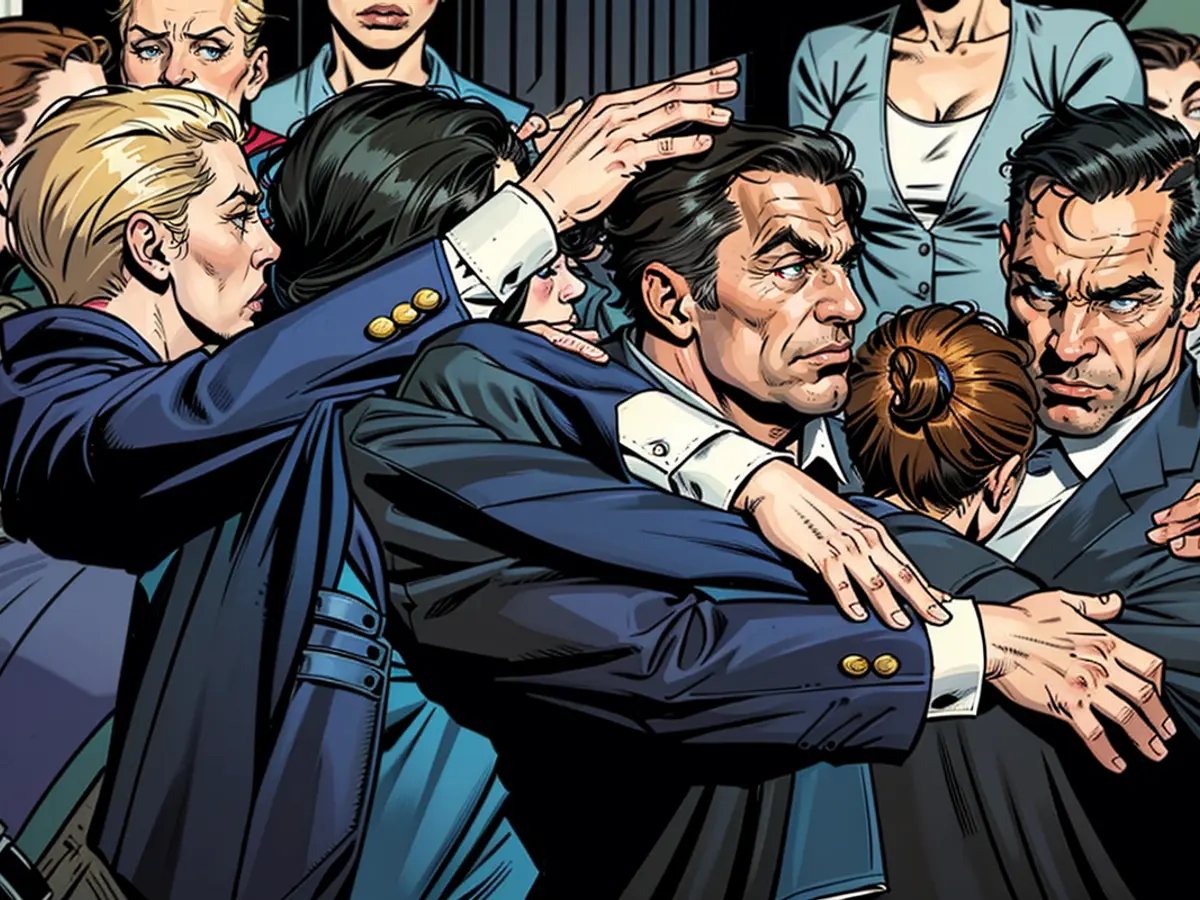In Russia, it is claimed that Kiev had a hand in it
ntv.de: How has Russia reacted to the attack on Donald Trump?
Alexander Friedman: This event is of great significance for the whole world. It's interesting that the official position of the Russian government was only conveyed by Vladimir Putin's press spokespersons and the Foreign Ministry. The whole world is talking about it. Foreign leaders are calling Trump. Even for Xi Jinping, who obviously has no good relationship with Trump, it was clear: In such a situation, one cannot remain silent, one must take a position. That is also diplomatically necessary. And what does the Russian side do? Maria Zakharova, the spokesperson of the Russian Foreign Ministry, initially expresses Schadenfreude before shifting the blame towards Ukraine. She doesn't directly accuse Ukraine for the attack, but it's heading in that direction: Now the US is getting a taste of Ukrainian affairs. There's no talk of well-wishing for Trump's recovery.
But why is Putin silent?
The Kreml believes that the US is waging a hybrid war against the Russian Federation by supporting Ukraine. They see themselves in a war against the US. And when something happens to your enemy in the war, you don't wish them well. That's why Putin's silence can be explained. But it could also be that he speaks up later.
And how does propaganda react?
Of course, with various conspiracy theories. There are a few narratives that can be highlighted. First, the eternal Russian theme - the connection to Ukraine. That can't be missing. Not only were there bloggers and commentators in social media, but also Russian parliamentarians who explicitly stated: Kiev had a hand in it. Trump was a danger for them because he no longer wanted to supply weapons. It was in the interest of Ukraine if Trump died.
Are there any evidence presented in Russian media that proves Ukrainian involvement?
For example, a fake story circulating on the internet claims that they found a supposed Social Media profile of the shooter with the banner "We stand with Ukraine". The fact that the shooter is portrayed as a supporter of Ukraine in Russian media is nothing new: The same story emerged immediately after the attack on the Slovak Prime Minister Robert Fico. In that case, in Russia, it was claimed either that it was done on behalf of Ukraine or that the shooter was a person who sympathized with Ukraine.
What other narratives are being spread?
The dominant narrative in Russian media seems to be the internal one. According to this, it was the Democrats' hatred of Trump that provoked the attack. Above all, liberal media, those against Trump - but also against Putin - had spread this poison against Trump and thus created the preconditions for the attack. There are also direct accusations against Biden: He is said to have given the order to kill Trump.
Are there any reasonable voices in Russian media?
How comes it that viewers rather believe in conspiracy theories, although they are rejected by experts in propaganda media?
That's absurd. But in essence, it's the development of Soviet narratives. For instance, if we compare the depiction of the attack on Trump with what the Soviet press wrote about the assassination attempt on Ronald Reagan in 1981, we can find significant similarities. The theme: Americans interfere everywhere in the world, they try to impose their will, and at the same time, they find themselves in a catastrophic situation on the brink of a civil war. This wishful thinking is strongly emphasized today: That there could be a civil war in the US. Russian propaganda builds on Soviet traditions and conspiracy theories and develops further.
What outcome of the US election does the Kremlin wish for?
Putin recently said it doesn't matter to him who wins the US election, as the situation for Russia wouldn't change. Then he said he'd prefer Biden over Trump because Biden is predictable. These statements from Putin were not taken seriously in the West. In the West, there's a simplified notion that the Russians unconditionally hope for Trump.
Isn't that so?
In 2016, the Russians clearly helped Trump win the elections. But the experiences they had with him are not necessarily positive. The relationship between Russia and the US has fundamentally not improved under Trump. A possible second term for Trump is seen by the Russians as a leap into the unknown. They don't know what to expect from him. Trump is, from a Russian perspective, somewhat of a risk factor. Both sides are mutually detrimental, but Trump is predictable. They know that Biden has certain red lines. He's not interested in a direct conflict with Russia. He also curbs the support for Ukraine - for example, he doesn't allow the deployment of long-range weapons against Russian targets. And he's currently against Ukraine joining NATO. He's an enemy, but at least predictable.
What scenario would be perfect for Russia?
It would be particularly advantageous for the Kremlin if the US sank into chaos. Because then, the Americans would be preoccupied with themselves and have no time for other countries. In 1981, after the assassination attempt on Reagan, who was a burning enemy of the Soviet Union, there was a great hope in Moscow that there would be unrest, conflicts, civil war-like situations in the US. And today? If I look at Russian reporting, there's indeed this wishful thinking: It's a shame that the situation remains quite calm and that the US is still far from a civil war.
Interview with Alexander Friedman by Uladzimir Zhyhachou.
- Despite the attack on Donald Trump being a global topic, Maria Zakharova, the Russian Foreign Ministry's spokesperson, initially showed Schadenfreude towards the situation, subtly suggesting Ukrainian involvement.
- The Kremlin, led by Vladimir Putin, has remained relatively silent on the attack on Trump, as they view the US as waging a hybrid war against Russia through their support of Ukraine.
- Russian propaganda has seized the opportunity to spread conspiracy theories about the attack, with a prominent narrative suggesting that liberal media and Democrats in the US were responsible for creating the conditions that led to the attack.









